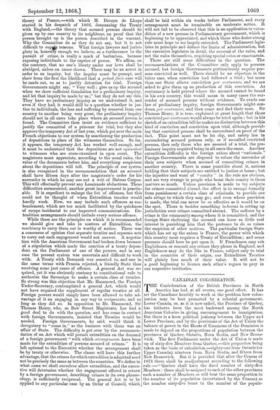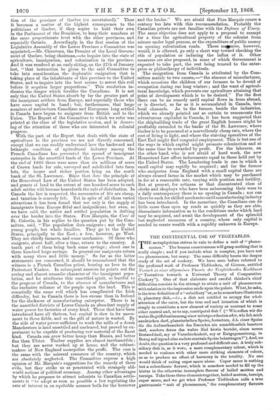CANADIAN COLONIZATION.
THE Confederation of the British Provinces in North America has had, at all events, one good effect. It has set the Canadians heartily to work at the problem how colon- ization may be best promoted by a colonial government. Lower Canada, or, as it is now called, the Province of Quebec, has hitherto been the most backward among the North American Colonies in giving encouragement to immigration. But there is a keen political jealousy between the Upper and Lower Province, and by the provisions of the Act of Union the balance of power in the House of Commons of the Dominion is made to depend on the proportions of population between the provinces of Quebec, Ontario, Nova Scotia, and New Bruns- wick. The first Parliament under the Act of Union is made up of sixty-five Members from Quebec,—this proportion being taken as the basis of calculation,—eighty-one from Ontario (or Upper Canada); nineteen from Nova Scotia, and fifteen from New Brunswick. But it is provided that after the Census of 1871 there shall be readjustment according to the following rule :—" Quebec shall have the fixed number of sixty-five Members : there shall be assigned to each of the other provinces such a number of Members as will bear the same proportion to the number of its population (ascertained by the Census) as the number sixty-five bears to the number of the popula-
tion of the province of Quebec (so ascertained)." Thus it becomes a matter of the highest consequence to the politicians of Quebec, if they aspire to hold their own in the Parliament of the Dominion, to keep their numbers at the same proportionate level with the other provinces, and especially Ontario. Accordingly, in the first session of the Legislative Assembly of the Lower Province a Committee was appointed,—Mr. Chauveau, the Premier of the Local Govern- ment of Quebec, being chairman,—to inquire into the state of agriculture, immigration, and colonization in the province. And it was resolved at an early sitting, on the 27th of January last, " that instruction be given to the said Committee to take into consideration the deplorable emigration that is taking place of the inhabitants of this province to the United States, and to inquire into the best means to arrest this evil before it acquires larger proportions." This resolution in- dicates the danger which terrifies the Canadians. It is not only that the United States absorb by far the greater part of the immigrant settlers from Europe, and especially those who have some capital in hand ; but, furthermore, that large numbers of native-born Canadians and Europeans long settled in Canada have begun to emigrate from British soil to the Union. The Report of the Committee to which we refer was printed at the close of the legislative session, and is deserv- ing of the attention of those who are interested in colonial progress.
With the part of the Report that deals with the state of agriculture in the province we are not directly concerned, except that we can readily understand how the backward and lethargic condition of agricultural industry among the French Canadians has prevented the spread of immigrant enterprise in the unsettled lands of the Lower Province. At the end of 1866 there were more than six millions of acres of Crown lands for sale, surveyed and subdivided into farm lots, the larger and richer portion lying on the south bank of the St. Lawrence. Since that date the principle of the Homestead Law of the United States has been adopted, and grants of land to the extent of one hundred acres to each adult settler will become henceforth the rule of distribution. In Canada the law is respected, the necessaries of life are cheap, and taxation is scarcely felt. Yet in spite of all these varied attractions it has been found that not only is the supply of immigrants from Europe fitful and insignificant, but even, as we have said, the native and settled population is drifting over the border into the States. Pere Marquis, the Cure of St. Celeatin, in his replies to the question put by the Com- mittee, said, " The population does emigrate ; not only the young people, but whole families. They go to the United States, principally to the East ; a few, however, go West. 'They are chiefly farmers, and some mechanics. Of those who emigrate, about half, after a time, return to the country. A tenth part of them bring back some savings ; about one in three hundred large savings. In general our emigrants return with many vices and little money." So far as the latter statements are concerned, it should be remembered that the witness is a French Canadian priest, bearing no love to the Protestant Yankee. In subsequent answers he points out the roving and almost nomadic character of the immigrant popu- lation, and he attributes this unsettled spirit, so hurtful to the progress of Canada, to the absence of manufactures and the exclusive reliance of the people upon the land. This is essentially the same evil which has complicated the Irish difficulty, but in Canada there is less excuse than in Ireland for the slackness of manufacturing enterprise. There is in the unsettled districts of Lower Canada an abundant supply of water power for factories of every kind. Those that have been introduced have all thriven, but capital is slow in its move- ment to these fields, and so the gift of nature is wasted. By the side of water power sufficient to work the mills of a dozen Manchesters is land unsettled and uncleared, but proved by ex- periment to be capable of producing raw material of the finest kind. Canada can grow better hemp than Russia, and better flax than Ulster. Timber supplies are almost inexhaustible ; but they are never worked up at home, and the cabinet- makers of New England monopolize the profit. The case is the same with the mineral resources of the country, which are absolutely neglected. The Committee express a high opinion of Mr. Marquis's suggestions for the remedy of these evils, but they strike us as penetrated with strangely old- world notions of political economy. Among other advantages by which he proposes to attract colonists to Canadian settle- ments is " to adopt as soon as possible a law regulating the rate of interest in an equitable manner both for the borrower and the lender." We are afraid that Pere Marquis comes a century too late with this recommendation. Probably the Canadian priests are not familiar with the Defence of Usury. The same objection does not apply to a proposal to exempt for a time the agricultural property of the colonist from seizure under legal process, or the expenditure of public money on opening colonization roads. These mipures, however, would, it is allowed, go only a short way toward checking the ebb of population or inducing the influx of it. Other measures are also proposed, in some of which Government is expected to take part, the rest being trusted to the enter- prise or philanthropy of individuals.
The emigration from Canada is attributed by the Com- mittee mainly to two causes,—" the absence of manufactures, which occasions the children of our farmers to be devoid of occupation during our long winters ; and the want of agricul- tural knowledge, which prevents our agriculture attaining that point of development which is to be desired." For the first there can be no remedy until capital flows in from abroad, or is directed, so far as it is accumulated in Canada, into local channels. As to the former, beside the industries, which we already pointed out as certain to remunerate the adventurous capitalist in Canada, it has been suggested that the shipbuilding trade of the great English houses might be profitably extended to the banks of the St. Lawrence, where timber is to be procured at a marvellously cheap rate, where the cost of living is light, and where the starving operatives of the East End might find congenial employment. This is but one of the ways in which capital might promote colonization and at the same time be rewarded by profit. For the labourer, on the other hand, who is not afraid of hard work, the new Homestead Law offers inducements equal to those held out by the United States. The Lumbering trade is one in which a small capital may rapidly be acquired ; and for the farmer who emigrates from England with a small capital there are always cleared farms in the market which may be purchased in fee at a reasonable rate, varying with position and fertility. But at present, for artizans or that discontented class of clerks and shopboys who have been unbosoming their woes to a daily contemporary there is no opening in Canada ; nor can there be such for skilled mechanics untilmanufacturing industry has been introduced. In the meantime, the Canadians can do little more than open up roads as quickly as they are able, disseminate information as to the conditions under which land may be acquired, and await the development of the splendid but neglected resources of a country, where only capital is needed to create wealth with a rapidity unknown in Europe.































 Previous page
Previous page